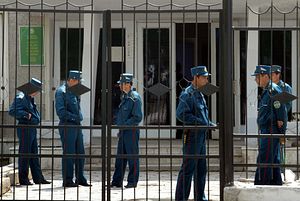China’s people-to-people cooperation with countries around the world covers various areas. These exchanges usually go far beyond now-accustomed economic assistance and reveal the true depth of cooperation between countries. One such emerging relationship between China and Uzbekistan is the cooperation of their police forces, where Uzbekistan plays the role of a mentee under China’s mentorship. Uzbekistan’s Academy of the Ministry of Interior Affairs — the main education facility of the country’s police forces and an equivalent to a police academy — and the People’s Public Security University of China, the elite police academy under China’s Ministry of Public Security, have been partners since May 15, 2017, when they signed a formal memorandum of cooperation.
The Ministry of Interior Affairs (MIA) of Uzbekistan has been the backwater of country’s security forces. In contrast, its sister organization, the Ministry of Defense, had benefited from NATO trainings and equipment in the 2000s. As defense forces underwent a degree of Westernization, shedding the Soviet military mentality, police forces in Uzbekistan stagnated. Their incapacity was on full display in the handling of the bloody 2005 events in Andijan. Since President Shavkat Mirziyoyev came to power, he has spoken about elevating the role of police and issued a decree in April 2017 to initiate reforms to the extent of ridding police of their current uniforms.
While MIA is preoccupied with internal reforms headed by its new civilian head Polat Bobojonov, in power since September 2017, China is emerging as its closest international partner. In the past two years, the agencies convened multiple times and MIA’s leadership signaled interest in China’s policing methods. For instance, Minister Bobojonov, during his July 2018 visit to China, marveled over the technology China uses to maintain public safety and expressed interest in introducing the same technology in Uzbekistan. China also offered a financial incentive of $22 million to the Simulation and Modelling Center of the Academy of the Ministry of Interior.
In addition, the police bodies of both countries have been actively exchanging delegations and students. Since 2016, China reportedly hosted 213 MIA employees in the span of 38 meetings for briefings on criminal investigation and forensics, countering terrorism, and illicit drug trafficking. The Uzbek delegation received a close-up overview of People’s Public Security University, and the sides agreed to develop master-classes for joint courses. Uzbekistan reciprocated its Chinese hosts by reportedly hosting 69 delegates, the latest taking place in August 2018 to brief young Chinese students on Uzbekistan’s history, customs, traditions, and governance.
China also extended cooperation with its Uzbekistan counterparts via an ambiguous invitation to the families of 35 deceased police to visit China in June 2017, but no information on the identities of the deceased police or causes of their deaths is known.
The active cooperation of Uzbekistan police forces with their Chinese counterparts in the context of recent large-scale tactical exercises infers full or partial testing of theoretical and practical experience acquired from Chinese. The exercises took place during July and August 2018, in Uzbekistan’s Andijan, Bukhara, Tashkent, Namangan, Samarkand, Surkhandarya, and Tashkent regions and simulated responding to various public safety crisis situations, including simulated robbery of a cash-in-transit vehicle or search and capture operation of armed individuals. The exercises were either conducted by the MIA alone or with the participation of other security forces of Uzbekistan. The tactical exercise held in the Tashkent region as broadcasted on O’zbekiston24 on August 30 was possibly the largest joint exercise among armed forces of Uzbekistan that simulated responding to multiple terrorist attacks and hostage-taking situations with the involvement of an Islamic cleric who negotiated a “hostage” release.
The active cooperation of Uzbekistan police forces with Beijing reveals concerns of Uzbekistan’s police to maintain public safety and react to domestic threats. At the same time, the MIA is clearly open to new ideas and methods to counter these threats, and China has been actively filling the need for international experience. This cooperation has larger implications for the future of the Uzbekistan police force given recently launched reforms in the MIA that will rebuild some of its institutional foundations. In this process China’s experience will be within arm’s reach.

































